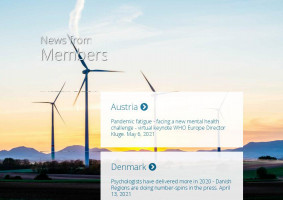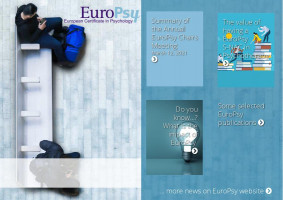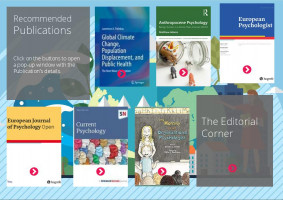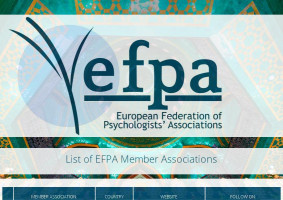Austria
Pandemic fatigue - facing a new mental health challenge - virtual keynote WHO Europe Director Kluge. May 6, 2021

Pandemic fatigue - facing a new mental health challenge - virtual keynote WHO Europe Director Kluge
May 6, 2021
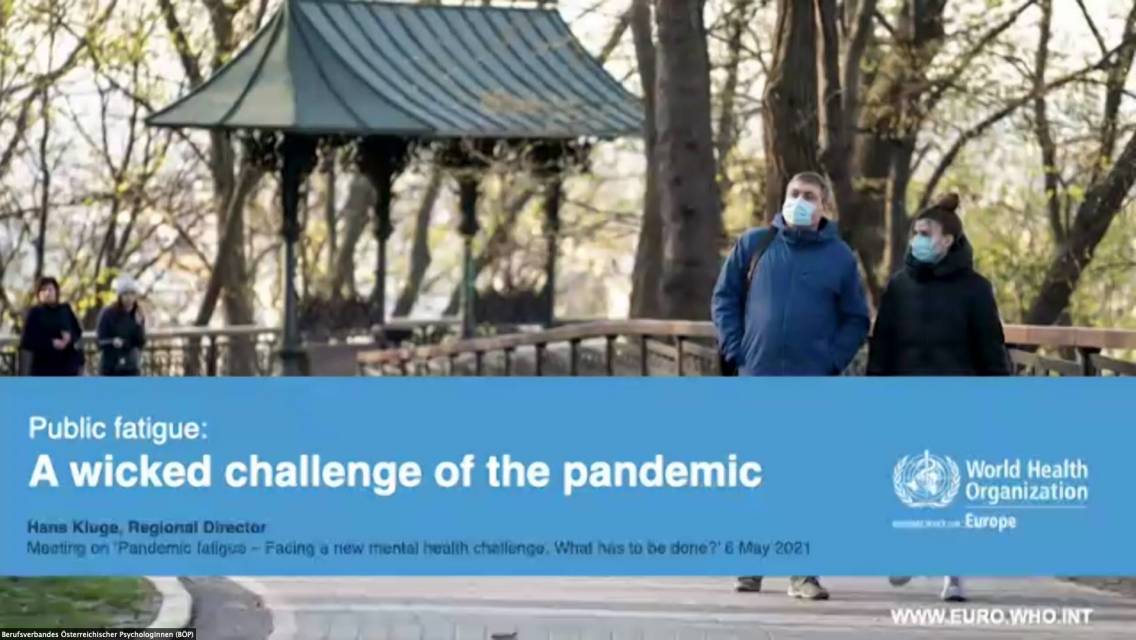
Abstract:
Governments across the world are reporting pandemic fatigue in their populations; a natural reaction to a prolonged emergency, yet with a potential to adversely affect the wellbeing of populations as well as efforts to control the spread of the virus. Dr Hans Kluge will deliver a keynote speech on the topic of public pandemic fatigue, including how pandemic fatigue expresses itself, and how it may be monitored in population surveys. He will present WHO recommendations on how to respond to and address public pandemic fatigue. Dr Kluge will also invite speakers to discuss the possible immediate and longer-term impacts of pandemic fatigue on the resilience of populations, including their ability to cope with and later recover from the pandemic.
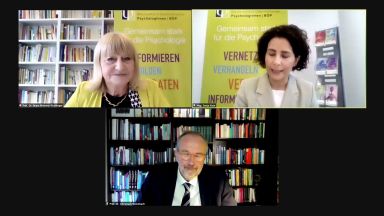
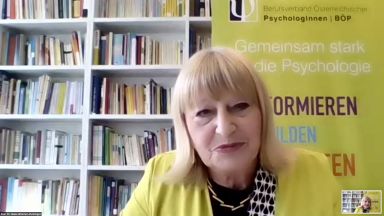
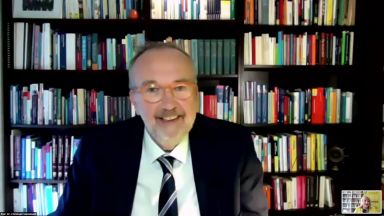
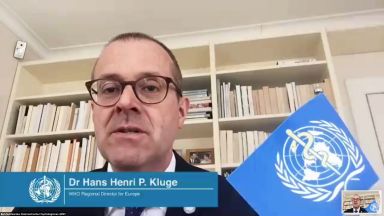
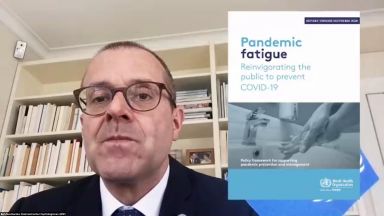
_w384_h216_1.jpg)
_w384_h216_1.jpg)
_w384_h216_1.jpg)
Denmark
Psychologists have delivered more in 2020 - Danish Regions are doing number-spins in the press. April 13, 2021


At Easter, one could read in Jyllands-Posten that Anders Kühnau, chairman of the Regions' Tariff and Wages Board, criticizes the psychologists in the public system for seeing too few patients. According to Eva Secher Mathiasen, chairman of the Danish Psychologists' Association, there is a distortion of numbers. The Danish Regions neglect that many psychologists have just worked hard to alleviate the mental aftermath of the corona crisis: When we calculate the figures for consultations and services, we can see that during the corona crisis, the psychologists have delivered thousands of services more than usual - and this is despite the closure in the spring. When we exclude the spring lock-down months, the psychologists have during almost all other months in 2020 seen both more patients and produced far more than in 2019. The Danish Regions know this well, because it is their own numbers. That is why it is very strange that Anders Kühnau and the Danish Regions choose to criticize the psychologists in the situation we are in” says Eva Secher Mathiasen.
13,200 more consultations in 2020
The Danes have needed significantly more psychological help and treatment during the COVID-19 crisis. This is confirmed by the figures, just as research shows that an increased incidence of particular anxiety and depression is an expected consequence of a societal crisis. Since before the summer holidays of 2020, the Danish Psychologists' Association has warned the Danish Regions that there will be further pressure on the psychologist scheme during the corona crisis. At the same time, the waiting time is historically high.
The figures also show that psychologists within the Health Insurance scheme (read about this in box below) - despite the massive shutdown in the spring - have delivered approx. 13,200 more services compared to 2019. It is admittedly correct that the psychologists in number have seen slightly fewer patients in 2020 compared to 2019 - corresponding to 0.2 per cent - but this is mainly due to the closure last spring.
Like everyone else in the health care system, the psychologists' clinics have obviously been affected during that period. Many patients did not dare to show up, and we worked at high pressure to switch from physical attendance to video and telephone consultations. But it is also because the degree of anxiety and depression has been far more challenging than usual. This is not so strange in a time of crisis, but it does mean that the psychologists use several consultations on the individual patient. In that light, the decline in the number of patients is very small. I believe that the psychologists instead deserve great recognition for their efforts, and that the Danish Regions 'criticism is completely inappropriate ", says Eva Secher Mathiasen, who points out that anxiety and depression patients in particular fill the psychologists' consultations massively.
Psychologists within the Health Insurance scheme
As an addition to the psychological treatment offered to all citizens free of charge in the public mental health system by public employed chartered psychologist in Denmark, some private chartered clinical psychologist offers psychological treatment services via the Public Health Insurance System in Denmark (called Sygesikringsordningen: The Health Insurance scheme). The scheme lists several disorders/mental health conditions that must be met in order for the GP to refer the citizen to psychologist in this scheme. The citizen is always referred to the private psychologist who is affilitated with this scheme via the GP. Via this scheme citizens can achieve treatment for greatly reduced fees from privately practicing chartered psychologists.
Unused millions in psychologist scheme
A negotiation meeting with Danish Regions has not yet been planned, but the Danish Psychologists' Association has clear expectations. There is a special focus on the fact that in the recent years the Danish Regions have systematically used a larger part of the money that the Parliament has set aside for psychological treatment for other purposes. In 2020, there were 73 million nationwide. DKK in underconsumption:
For the sake of the many citizens who need psychological treatment, the Danish Regions have a duty to take initiatives to get the allocated money spent on psychological treatment and reduce the waiting time. In accordance with the decision from the Parliament to expand the psychologist scheme, the Danish Regions have not created correspondingly more external numbers at all. We know that many psychologists would like to be apsychologist within the Health Insurance scheme, but many are rejected despite being qualified. It would be both a simple and flexible way to expand capacity so that waiting time could come down, ”says Eva Secher Mathiasen and continues: In addition, we have proposed raising the limit on how much psychologists can work, so that those who have the opportunity can take in more patients. Even if it would not expand the capacity so much, it would still help some psychologists."
At the same time, the Danish Psychologists' Association has also contacted the health and psychiatry rapporteurs at the Parliament, because the association wants the money for psychologist treatment to be earmarked in the future.
We can see that the money for psychological treatment goes year after year to gaps in the Danish Regions' budgets, at the same time as the waiting time for psychological treatment increases and increases. It is not a good way to spend the taxpayers' money, and the politicians in the Parliament have not intended the many millions for the Danish regions' budget gaps - but rather to alleviate the Danes' mental illnesses, says Eva Secher Mathiasen.
Facts: Unused funds for psychologist treatment:
It is the Parliament that allocates funds via block grants to the Danish Regions. Statement shows that the money is systematically used for other things as well. The Danish Psychologists' Association's calculations show that in 2020 there was an underconsumption of DKK 73 million. DKK of the allocated funds for psychologist treatment.
a. More and more unused funds in the psychologist scheme
Unused funds the psychologist scheme, excl. free of charge *
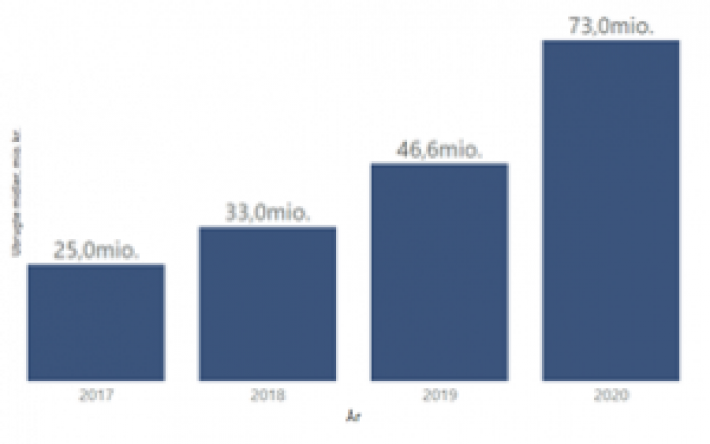
Source: Danish Psychologists' Association and Danish Regions
* In addition to these funds, there is also a separate pool for free psychological treatment of young people aged 18-21 (introduced in 2018), which will be expanded to 24-year-olds in mid-2021. In that pool is used all the funds and it is not included in the statement below.
Read more and find more facts on the website of the Danish Psychologists' Association
Finland
The Finnish Psychological Association's messages on the mid-term negotiation. April 20, 2021


The government will meet on 21-22 April 2021 for the so-called mid-term policy review session, during which the main lines of the budget framework for the coming years will be decided. The Psychological Association recalls that the corona crisis has been a mental health crisis in many ways. Recovering from exceptional circumstances requires strong investments in mental health services.
Basic mental health services for adults
The starting point of primary health care work is health, its promotion and care. Consultation from specialised medical care in Health and Social Services Centres necessary but cannot replace mental health care and psychological services in the basic health care. In terms of mental health, a psychologist is best at assessing the need for treatment. At present, however, a large proportion of adults and elderly in Finland are completely excluded from psychosocial support and psychological services.
Implement a healthcare guarantee that includes mental health services
The tightening of the care guarantee must take effect and must also apply to mental health services, including psychological services. The availability of high-quality, multi-professional mental health services close to people's daily lives must be secured at different stages of their lives.
Health and Social Services Centres must have their own psychologists
Basic services require their own psychologists. Psychosocial methods alone do not help, skills are needed for both treatment, assessment of the need for services and supervision of professionals. Psychologists must be part of the multi-professional Teams of Health and Social Services Centres, in patient work, consulting as well as planning and development work.
An occupational health psychologist must be defined as an occupational health professional
Mental health support is also needed for occupational health care. Mental health problems have become the biggest threat to careers in Finland, causing a loss of up to 17 million working days a year. An occupational health psychologist must be defined as an occupational health professional. The employee then has access to the services of a psychologist directly without a referral, which reduces unnecessary visits to the office of the occupational health doctor and occupational health nurse. The Psychological Association considers it necessary to define physiotherapists as occupational health care professionals in connection with the amendment of the Occupational Health Care Act, but at the same time the status of an occupational health psychologist must be changed to a professional.
The well-being of children and young people must be supported in everyday life
The COVID-19 crisis and its exceptional circumstances have affected every child, young person and their family. Promoting the well-being and health of children and young people in exceptional circumstances and in crisis aftercare is one of society's most important tasks. The role of psychologists in schools in this work is significant.
The Government's proposal to transfer psychologists and curators from schools to Wellbeing Services Counties must be withdrawn
Student's well-being in schools needs to be strengthened, not driven to administrative changes. The transfer would take school psychologists and curators out of school communities into Wellbeing Services Counties, even though the whole school community, children and young people as well as adults, specifically need future-proof preventive learning and timely learning and mental health support. Strengthening the community and interpersonal relationships must be at the heart of pandemic aftercare. To succeed, school psychologists and curators must continue to be an integral part of the school community.
Binding conditions for psychologists and curators are needed for student care
The resources of student care must be intoduced without delay: in schools there can be a maximum of 500 pupils or students per psychologist. In this way, the services are available in a timely manner and the objectives of the Pupil and Student Wellbeing Act and the School Act can be implemented. About 500 psychologists are currently missing from schools and colleges. The number of psychologists is constantly growing, as there are more graduates than retirees. In order to have enough of them for school care as well, there must be sufficient vacancies for psychologists and the public sector must invest in recruitment skills as well as employment conditions and a reasonable framework for the job.
Responding to the need for specialist psychologists with free training
The Finnish Psychological Association strongly emphasises the importance of competence in mental health services. The expertise of a specialist psychologist is needed in, among other things, student care, Health and Social Services Centres, the field of neuropsychology and workplaces – for treatment, research, preventive work and multi-professional teams.
Make free of charge specialization training leading to a specialist psychologist's qualification
In terms of the availability of experts, it is necessary to make the currently paid specialisation training leading to a specialist psychologist's qualification free of charge for the student, such as specialization training in social work and specialization training in doctors. About 150 specialist psychologists graduate every three years, but the annual cost to the state would only be one million euros.
France
Psychologists are essential... April,11, 2021
Our president likes psychology cheques… but not psychologists. April 15, 2021
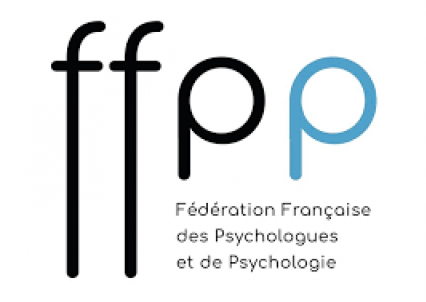

Since April 2020, psychologists have been called upon to intervene with a population particularly weakened by this crisis. During the first lockdown, and in a surge of solidarity, many people mobilised to respond voluntarily on the help platforms put in place. The others, in medico-social institutions and hospitals, of course, mostly continued to work. We were then, it seems, essential. Several announcements by the Minister of Health underlined the importance of psychologists in this particular period. However, during the second lockdown, it was at request of the FFPP (french Federation of Psychologists and Psychology) that the Ministry clarified that psychologists could continue to work.
During this third lockdown, the FFPP must again call on the Ministry of Health to ensure that liberal psychologists can benefit "from the childcare solutions established for the children of professionals that are essential for the management of the epidemic".
Answer: “the subject is sensitive…”.
No, the subject is not sensitive. If we are an essential profession, if it is proposed to make psychological support more accessible to the population, why are we authorised to open our practices without to obtain priority access to childcare? We would like to remind that in order to benefit from childcare, both parents must be considered as a priority and that there is no recourse to family support. In other words, it will only benefit to few of us, but political biases are above all symbolic signals that we, psychologists, need at this time.
So, priority or not? Priority to support students? Or not? Because, paradoxically, for many of them, that will not be possible… knowing that 86% of the profession is female.
Before it is too late, we insist once again for the psychologists to be included on the list of essential AND priority professionals.

The President of the Republic announced on Wednesday , April 14th, the introduction of a package of ten sessions for children from 3 to 17 years old, with a psychologist installed as a liberal. Obviously, this announcement is very appreciated by parents or adults who provide parenting, and for good reason.
But no, Mr. President, psychologists cannot be found in surprise bags!
For a year now, the organisations representing the profession (FFPP and SNP) have been working with the Ministry of Health on the issue of reimbursement for consultations with psychologists. Since autumn 2020 and following the measures of Ségur, we have also been working with general practitioners ofthe Multi-Professional Health Houses and the Cnam on a project that should have been ambitious and for which the Ministry of Health has slowed down progress in order to '' include children and adolescents in a built project".
The Cnam remains very attached to the experimentation model implemented in four departments since January 2018 for adults aged 18 to 60 with mild to moderate anxiety and depressive disorders. The profession firmly claims its opposition to prescription and a decent price not the 22 euros priced in the experiment.
Following the presidential announcements in February, our Federation supported the specific tool for students in the form of a psychological support cheque book. We then underlined the exceptional and temporary measure by which psychologists were willing to engage in solidarity support for students in need despite a price that did not correspond to our practices.
No, psychologists are not professionals who are, on the one hand, "rung for” with gift vouchers while on the other hand our profession is amogst those who will benefit from a revaluation of the grids within the framework of the Ségur, nor amogst the professions considered essential when it comes to childcare.
This gives the impression that we are professionals who are sold to our fellow citizens through advertising and communication effects, without tbothering to discuss the needs and modalities with the professionals themselves.
We are relationship professionals, autonomous, with a unique, protected title and a plurality of practices.
Today, like in February, the price is of course not announced… completely reimbursed without advance payment… like the 30 euros for students? Like the 22 euros of the experiment??
An announcement without consultation, regardless of working hours with the Ministry of Health and all the partners involved in the negotiations, with a view to real progress in time for all users!!
We are opposed to this umpteenth device and demand a real decision on reimbursement by trusting a profession that has been working for the population in psychological distress for more than 50 years.
Germany
No over-regulation of further training in psychotherapy: Four years are enough! The petition enjoys great support. April 16, 2021


Berlin, April 15, 2021. The German Society for Psychology (DGPs) and the Faculty Day Psychology (FTPs) support the positions of the student union PsyFaKo and call for a change from five years to four years in the draft of the Model Speciality Training Regulations for Psychotherapy (MWBO). Almost 10,000 people are already supporting the petition to change the MWBO.
On April 23rd and 24th, the 38th German Psychotherapists' Day will discuss and vote on key points of theModel Speciality Training Regulations for Psychotherapy (MWBO). The duration of the speciality training to become a specialist psychotherapist after studying psychology with a corresponding specialisation and obtaining a license to practice medicine. In its current version, the draft proposes for a further training period of five years. “From our point of view, the majority of the currently planned framework conditions are technically sound and understandable. However, extending the qualification period after graduation from three to five years goes beyond the principle of proportionality,” says Conny Herbert Antoni, chairman of the Psychology Faculty Day.
According the new licensing regulations for psychotherapy, the psychology degree programme with a corresponding specialisation on clinical psychology and psychotherapy is much more focused on psychotherapy content than before the reform of the Psychotherapists Act. Since the course integrates elements of the previous (specialist) psychotherapy training, it enables the license to practice psychotherapy immediately after the master’s degree. Therefore, in spite of the expanded professional profile, an expansion of five years of the Specialty Training in Psychotherapy after graduation is not necessary to acquire the necessary specialist skills and not proportionate.
With an extension of the duration of further training, dependencies on clinics and further training institutes would be extended once again. There is a risk that there will be too few training places due to the extended training periods, which require employment in the inpatient and outpatient sectors.
In its current version, the draft leaves no freedom for individual life planning: a doctorate should still be possible alongside further training in order to secure the next generation of scientists and thus the scientific basis of psychotherapy - however, parallel scientific qualifications are made substantially more difficult with the current draft. The work-life balance is also made more difficult if the duration of further training is extended. Comments made by a person affected by the signature campaign indicate: "We do not need any unnecessarily extended training periods that further manifest the gender gap".
The Psychology Faculty Conference, representing the psychology students and thus those most affected, had already petitioned in a position paper to the associations involved in December 2020 not to extend further training to five years. "We expressly support this demand," explains Winfried Rief, Chairman of the DGPs Commission on Psychology and Psychotherapy Training. “The freedom to plan one's life and the freedom of occupation are blatantly restricted by a five-year further training. The decision on the duration of specialty training cannot be made without taking into account the needs of those affected. Four years are enough!”
Link to the petition: https://www.openpetition.de/petition/online/weiterbildung-psychotherapie-vier-jahre-sind-genug
Hungary
An overview of the psychological consequences of the first year of the pandemic. March 5, 2021
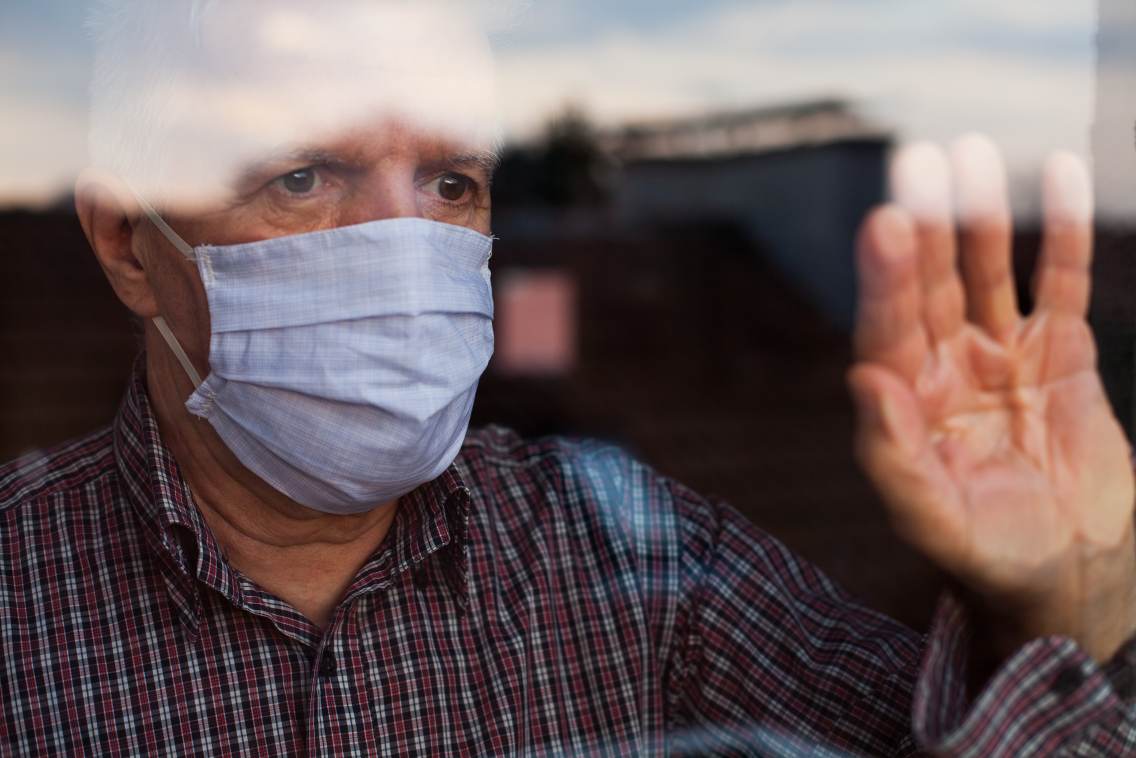
Colleagues in all disciplines of psychology have felt the effects and have done much to raise awareness and improve the situation in many forms (and forums).
In the following, we try to summarise the experience from the perspective of disaster psychology.
As a result of the outbreak of the Covid-19 world pandemic in Hungary, the government declared a state of emergency on March 11, 2020. After one year, it is worth reviewing the impact of the pandemic period on people’s psychological state and physical and mental well-being so far, and how these states may have interacted with the social and economic impacts of the pandemic.
We are currently in the third wave of the pandemic, so it is worth drawing lessons so that psychologists can also be more effective - or act more effective - to normalise the situation.
It is well known that a pandemic is a disaster in both legal and psychological terms, creating a crisis situation. It has therefore provoked the same human reactions worldwide as we have experienced in any other crisis, and which are well known from disaster psychology.
The human behaviours and mental symptoms that appear in disasters have a specific chronological order, which can be roughly divided into four phases. At the outbreak of the Covid-19 pandemic, these ran roughly similarly around the world and were partially repeated in new waves of the pandemic.
Read full article on the website of the Hungarian Psychological Association
Portugal
- OPP launches “eu sinto.me” website. April 7, 2021
- Celebrate 1 year of Psychological Counseling ServiceSNS24 (telephone assistance). April 1, 2021
- OPP magazine “there is no health without psychological health”. March 31, 2021
- National Psychology Forum: "Psychology for Psychologists" magazine is now available for download. March 19, 2021
- OPP eBook "High Performance Teams". March 15, 2021
_w284_h314_1.jpg)
OPP launches “eu sinto.me” website
April 7, 2021
World Health Day was also the day the OPP launched another website: www.eusinto.me, a portal that brings together a set of information and resources on psychological health and well-being. This portal is completely free and available for children, parents and caregivers, students, teachers and educators, health professionals and decision makers, media and, of course, psychologists.
All available information is based on evidence from Psychological Science and updated regularly. Eu Sinto.Me is a digital guide to psychological health and well-being, available always and everywhere.

One of the key elements of this portal is ANA - a virtual assistant who can offer information and resources that are useful and appropriate to your needs. When writing what you are looking for, telling her what you feel, ANA will present a set of themes and resources that may interest you.
Visit www.eusinto.me !
On April 1, the SNS24 Psychological Counseling Service (which had the support of PPA in the beginning) had one year of existence. We share some data at the time: 75,000 calls were answered in one year (6000 from health professionals). The line was a resource to answer the pandemic needs, but now we know that, will be active until 2024.
OPP magazine “there is no health without psychological health”
March 31, 2021
The first edition of this year’s PSIS21, the OPP magazine, is now available. With a new visual and editorial approach, this magazine includes more emphasis on our professionals and their projects, as well as topics that may also be of interest to the general population, communities and decision makers.
This issue of PSIS21 is divided into five societal challenges: Work and Sustainable Development, Demography and Aging, Education, Justice and Equity, Health and Well-Being and Migration. We hope you enjoy reading this magazine as much as they did enjoy writing it for you! Good readings.

"Psychology for Psychologists" is now available. This is a product of the National Psychology Forum of Portugal, which includes representatives proposed by all Portuguese Higher Education, aiming to strengthen cooperation between the OPP and these institutions.
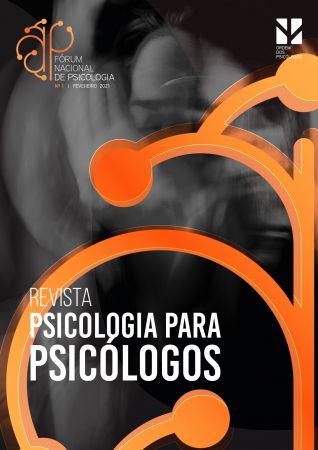

The OPP eBook "High Performance Teams" co-authored by Pedro Almeida, Pedro Marques Quinteiro and Duarte Pimentel is now available for free.
Click here to download the eBook

Spain
Impact of COVID-19 on suicide rates: an opportunity for prevention. April 23, 2021
_w356_h164_1.png)
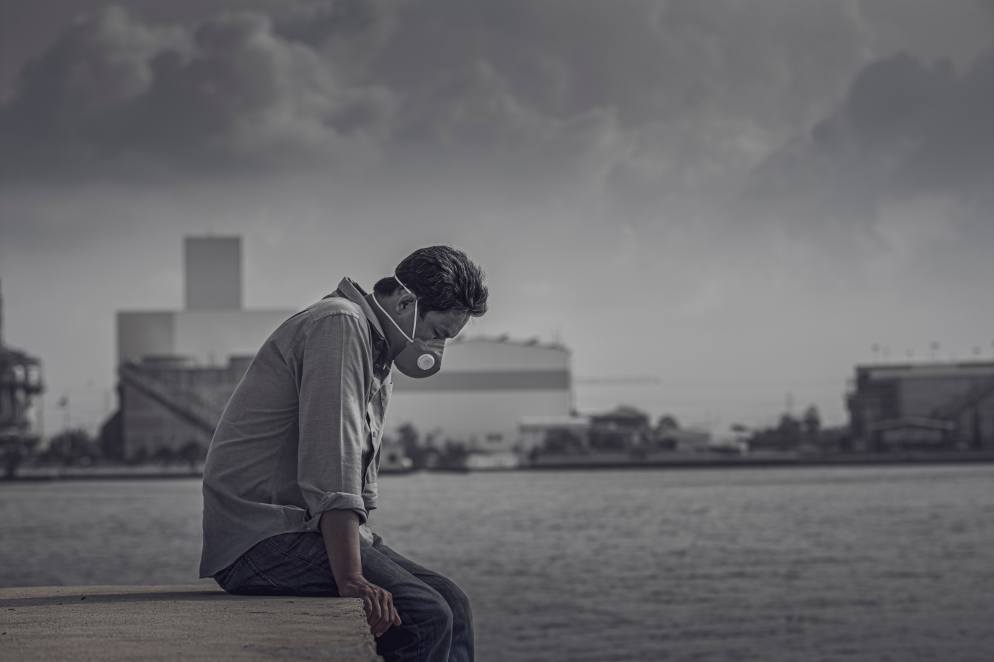
"Caution." This was the request made by Hawton et al. at the beginning of this year 2021, both to the scientific community and to the media, given the omens and predictions of a potential increase in suicide rates during the COVID-19 pandemic. During the past annus horribilis, numerous authors expressed their concerns about the possible consequences of confinement in the increase in acts of suicide in the world population (for example, Gunnell et al., 2020; Reger et al., 2020).
We were (and still are) facing an unprecedented situation that posed a challenge for all people, particularly those in vulnerable situations and with risk factors for mental health problems.
It seemed reasonable to think that isolation, uncertainty, economic difficulties or the presence of stress could lead to a rise in lethal acts of suicide, raising the number of deaths caused by the pandemic.
It was unclear if this increase would occur in the short or long term, but it was clear that the health and scientific community should be prepared for a challenging period that, which, on the other hand, also offered the opportunity to make progress in the field of suicide prevention.
At the same time, in an attempt to reduce stigma, the use of alarmist language and the population's sense of hopelessness, it was recommended to avoid the idea of automatically merging the deterioration of mental health and the occurrence of suicide. Furthermore, this period was presented as an occasion for social cohesion and the activation of protective factors, such as social support or the provision of reliable information about the availability of crisis help (Klomek, 2020; Hawton et al., 2020).
After a year of speculation, the first international study with data collected in twenty-one developed countries located in various parts of the world has just been published (Pirkis et al., 2021). This collaborative study, signed by dozens of renowned authors and published in The Lancet magazine, provides a clear finding: there has been no increase in suicide rates during the first months of the pandemic. In other words, the number of observed suicides is not significantly higher than the expected number of suicides in any country, nor in any of the areas studied (including Spain). On the contrary, compared to the expected number, in twelve of the countries included in the study, there is statistical evidence of a decrease in suicide cases. What interpretation do the authors offer for this result? First, the self-reported increase in levels of anxiety, depression, and suicidal thoughts does not appear to have translated into a correlative increase in suicides, at least in the countries that were part of the study. The rapid implementation by governments and other official institutions of new access routes to mental health services seems to have been a crucial aspect in suicide prevention.
Secondly, various protective factors have been put in place, such as the presence of a collective sense of community, support for vulnerable people through new technologies, or spending long periods of time together at home, reducing thus stress and the feeling of isolation and emptiness. Finally, most of the governments of the countries in the study have taken measures to tackle the predictable economic crisis, providing economic resources to many families who, had they not been able to access this aid, would have had significant risk factors. However, the authors remain alert to possible changes that may occur in the coming months or in other developing countries.
This situation also allows us to reflect on the contextual nature of suicidal behaviour, which would not automatically emerge as a "symptom" derived from the increase in mental health problems, but would be presented as a complex, multidimensional and multifactorial phenomenon, in which realities of different types and orders (cultural, social, institutional, psychological, etc.) participate simultaneously. It seems, therefore, that a linear causal interpretation would not fit, but rather that suicidal behaviour should be understood in people's biographical contexts and in the presence of "meaning" in their suffering and in the particular experience of their difficulties (Al- Halabí and García Haro, 2021). Hence, it would not be a question of repairing supposed "faults" in the psyche, but of providing people with resources to improve their access to health services in crisis situations, reducing the presence of risk factors and enhancing protection factors. Likewise, sharing the concern, supporting in times of hopelessness, informing correctly about the available help services, sensitising the population about the need to provide social support, demolishing the stigma associated with suicidal behaviour and sharing responsibility for the care of vulnerable people appear to be valuable strategies to contain suicide rates.
More than at any other time, there is an opportunity to implement suicide prevention strategies. A prevention that must be approached primarily (although not only) from a psychological perspective, and planned and developed with the help of expert psychologists.
References
Al-Halabí, S., and García Haro, JM (2021). Psychological treatments for suicidal behaviour. In E. Fonseca Pedrero (Coord.). Manual of psychological treatments. Adults . Pyramid Editions.
Hawton, K., Marzano, L., Fraser, L., Hawley, M., Harris-Skillman, E., and Lainez, YX (2021). Reporting on suicidal behaviour and COVID-19-need for caution. The Lancet. Psychiatry , 8 (1), 15–17.
Klomek AB (2020). Suicide prevention during the COVID-19 outbreak. The Lancet. Psychiatry , 7 (5), 390.
Gunnell, D., Appleby, L., Arensman, E., Hawton, K., John, A., Kapur, N., Khan, M., O'Connor, RC, Pirkis, J., and COVID-19 Suicide Prevention Research Collaboration (2020). Suicide risk and prevention during the COVID-19 pandemic. The Lancet. Psychiatry , 7 (6), 468–471.
Pirkis, J., John, A., Shin, S., DelPozo-Banos, M., Arya, V., Analuisa-Aguilar, P., Appleby, L., Arensman, E., Bantjes, J., Baran , A., Bertolote, JM, Borges, G., Brečić, P., Caine, E., Castelpietra, G., Chang, SS, Colchester, D., Crompton, D., Curkovic, M., Deisenhammer, EA ,… Spittal, MJ (2021). Suicide trends in the early months of the COVID-19 pandemic: an interrupted time-series analysis of preliminary data from 21 countries. The Lancet. Psychiatry , S2215-0366 (21) 00091-2.
Reger, MA, Stanley, IH, and Joiner, TE (2020). Suicide Mortality and Coronavirus Disease 2019-A Perfect Storm ?. JAMA Psychiatry , 77 (11), 1093-1094.
Switzerland
The Swiss Federal Council decides to introduce the prescription model for psychotherapy performed by psychologists. March 19, 2021
_w244_h140_1.png)

The Swiss Federation of Psychologists (FSP), the Swiss Association of Psychotherapists (ASP) and the Swiss Professional Association of Applied Psychology (SBAP) are delighted with the decision taken March 19oday by the Federal Council on the new regulation of psychotherapy performed by psychologists. The introduction of the prescription model can remedy the inadequate supply of care in rural areas as well as the lack of treatment for children and adolescents. The only concern the associations of psychologists have is the therapy being limited to fifteen sessions per prescription.
Read more:
French text
United Kingdom
British Psychological Society’s response to the report of the Commission on Race and Ethnic Disparities. April 01, 2021
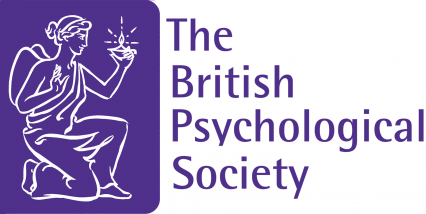

The British Psychological Society has today responded to the findings of the report of the Commission on Race and Ethnic Disparities.
Diane Ashby, Deputy Chief Executive of the British Psychological Society, said:
The findings of the report represent a missed opportunity to identify the causes of disparities in our society, systemic racism, and to drive forward the positive change the Government said it wishes to deliver. We are particularly concerned that the re-traumatising of Black, Asian and Minority Ethnic people through a denial of their lived experience, will have an adverse psychological impact. As stated previously we recognise that institutional racism exists and as an organisation we will tackle it. We stand shoulder to shoulder with our allies in striving for anti-racist practice and are committed to tackling racism within our profession. We will not be complacent.
Through close examination of various reports including the Stephen Lawrence report, The Lammy Review and more recently the Public Health England Covid report and the BPS’ Racial and social inequalities: Taking the conversations forward position paper written by BPS DCP Racial and social inequalities in the times of Covid-19 working group, it is clear that longstanding inequalities were exacerbated by Covid-19.
The British Psychological Society’s Division of Clinical Psychology outlined an urgent call to centre, support and learn from at-risk communities.
The British Psychological Society’s Division of Clinical Psychology outlined an urgent call to centre, support and learn from at-risk communities.
This position paper acknowledges that structural racism creates an environment where Black, Asian and Minority Ethnic populations are more likely to experience multi-layered inequities, some of which were recorded and commented on by Public Health England.
Our position paper also acknowledges and stigma and structural racism are real.
Moving forwards we recommend that we:-
- Recognise stigma and counter racism and bias at all levels
- Examine values and confront racist and prejudice within and outside
- Support and recognise the value added by the BAME communities
- Practice anti-racism and counter policies, which disadvantage vulnerable groups
- Engage with difference and vulnerability with respect and humility
- Champion antiracist ideas and non-discriminatory practices
- Talk about inequalities – Silence is not an option






